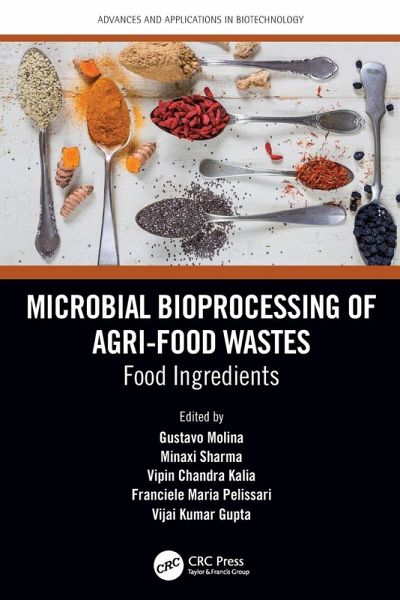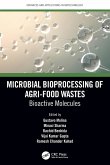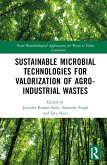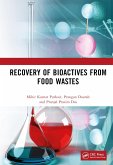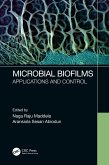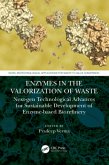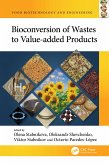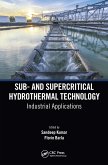Microbial Bioprocessing of Agri-food Wastes
Food Ingredients
Herausgeber: Pelissari, Franciele; Kalia, Vipin Chandra; Gupta, Vijai Kumar; Sharma, Minaxi; Molina, Gustavo
Microbial Bioprocessing of Agri-food Wastes
Food Ingredients
Herausgeber: Pelissari, Franciele; Kalia, Vipin Chandra; Gupta, Vijai Kumar; Sharma, Minaxi; Molina, Gustavo
- Broschiertes Buch
- Merkliste
- Auf die Merkliste
- Bewerten Bewerten
- Teilen
- Produkt teilen
- Produkterinnerung
- Produkterinnerung
This book gives a comprehensive overview of recent advances in the valorization of agri-food waste and discusses the main process conditions needed to overcome the difficulties of using waste as alternative raw materials.
Andere Kunden interessierten sich auch für
![Microbial Bioprocessing of Agri-Food Wastes Microbial Bioprocessing of Agri-Food Wastes]() Microbial Bioprocessing of Agri-Food Wastes68,99 €
Microbial Bioprocessing of Agri-Food Wastes68,99 €![Sustainable Microbial Technologies for Valorization of Agro-Industrial Wastes Sustainable Microbial Technologies for Valorization of Agro-Industrial Wastes]() Sustainable Microbial Technologies for Valorization of Agro-Industrial Wastes196,99 €
Sustainable Microbial Technologies for Valorization of Agro-Industrial Wastes196,99 €![Recovery of Bioactives from Food Wastes Recovery of Bioactives from Food Wastes]() Mihir Kumar PurkaitRecovery of Bioactives from Food Wastes177,99 €
Mihir Kumar PurkaitRecovery of Bioactives from Food Wastes177,99 €![Microbial Biofilms Microbial Biofilms]() Microbial Biofilms131,99 €
Microbial Biofilms131,99 €![Enzymes in the Valorization of Waste Enzymes in the Valorization of Waste]() Enzymes in the Valorization of Waste121,99 €
Enzymes in the Valorization of Waste121,99 €![Bioconversion of Wastes to Value-added Products Bioconversion of Wastes to Value-added Products]() Bioconversion of Wastes to Value-added Products184,99 €
Bioconversion of Wastes to Value-added Products184,99 €![Sub- and Supercritical Hydrothermal Technology Sub- and Supercritical Hydrothermal Technology]() Sub- and Supercritical Hydrothermal Technology49,99 €
Sub- and Supercritical Hydrothermal Technology49,99 €-
-
-
This book gives a comprehensive overview of recent advances in the valorization of agri-food waste and discusses the main process conditions needed to overcome the difficulties of using waste as alternative raw materials.
Hinweis: Dieser Artikel kann nur an eine deutsche Lieferadresse ausgeliefert werden.
Hinweis: Dieser Artikel kann nur an eine deutsche Lieferadresse ausgeliefert werden.
Produktdetails
- Produktdetails
- Advances and Applications in Biotechnology
- Verlag: Taylor & Francis Ltd
- Seitenzahl: 232
- Erscheinungstermin: 19. Dezember 2024
- Englisch
- Abmessung: 156mm x 234mm x 17mm
- Gewicht: 364g
- ISBN-13: 9781032376011
- ISBN-10: 1032376015
- Artikelnr.: 72108111
- Herstellerkennzeichnung
- Libri GmbH
- Europaallee 1
- 36244 Bad Hersfeld
- gpsr@libri.de
- Advances and Applications in Biotechnology
- Verlag: Taylor & Francis Ltd
- Seitenzahl: 232
- Erscheinungstermin: 19. Dezember 2024
- Englisch
- Abmessung: 156mm x 234mm x 17mm
- Gewicht: 364g
- ISBN-13: 9781032376011
- ISBN-10: 1032376015
- Artikelnr.: 72108111
- Herstellerkennzeichnung
- Libri GmbH
- Europaallee 1
- 36244 Bad Hersfeld
- gpsr@libri.de
Professor Gustavo Molina graduated in Food Engineering, earned his Master's degree (2010) and his PhD (2014) at the University of Campinas - Unicamp (Campinas - Brazil), and part of his doctoral research was developed at the Laboratoire de Génie Chimique et Biochimique at the Université Blaise Pascal (Clermont-Ferrand - France). Since 2013, he is an Associate Professor at UFVJM (Diamantina - Brazil) in Food Engineering and supervisor of students and researchers, being the head of the Laboratory of Food Biotechnology and conducting scientific and technical research. Dr. Minaxi Sharma is currently working as ERA Chair VALORTECH-Senior Research Scientist, Estonian University of Life Sciences (EMU), Tartu, Estonia. She is also the Assistant Professor, Department of Food Technology, Akal College of Agriculture, Eternal University, Baru Sahib, Himachal Pradesh, India. Dr. Vipin Chandra Kalia is presently working as Chief Scientist at Microbial Biotechnology and Genomics, CSIR-Institute of Genomics and Integrative Biology, Delhi. He is a Professor of Academy of Scientific and Innovative Research (AcSIR), Delhi. He obtained his M.Sc. and Ph.D. degrees in Genetics from the Indian Agricultural Research Institute, New Delhi. His main areas of research are microbial biodiversity, bioenergy, biopolymers, genomics, microbial evolution, quorum sensing, quorum quenching, drug discovery and antimicrobials. Franciele Maria Pelissari graduated in Food Engineering; earned her master's degree (2009) at the University of Londrina (UEL), Londrina, Brazil; and her PhD (2013) at the University of Campinas (Unicamp), Campinas, Brazil. Since 2013, she has been associate professor at the Institute of Science and Technology program at the Federal University of Jequitinhonha and Mucuri (UFVJM), Diamantina, Brazil, in Food Engineering, and also full professor in the graduate program in Food Science and Technology. Dr. Vijai Kumar Gupta received his PhD in Microbiology in the year 2009 from Dr RML Avadh University, India. Currently, he is working as an Associate Professor (Biochemistry) at AgroBioSciences (AgBS)/Chemical & Biochemical Sciences (CBS), UM6P University, Morocco.
Chapter 1. Microbial Valorization of Tomato Waste for the Extraction of
Carotenoids: Food Applications. Chapter 2. Bio-Valorization of Citrus-Waste
for the Production of Bioactive Molecules for Food Applications. Chapter 3.
Agri-Food Waste Utilization: Obtaining Protein Hydrolysates and Bioactive
Peptides as Functional Ingredient for Food Application. Chapter 4.
Microbial Fructo-Oligosaccharides Derived From Agri-Food Waste. Chapter 5.
Valorization of Vegetal Wastes for the Production of Antioxidants and
Vitamins. Chapter 6. Microbial Production of Citric Acid by Agro-Industrial
Residues From Solid-State Cultivation. Chapter 7. Agricultural Wastes: A
Feedstock for Citric Acid Production Through Microbial Pathway. Chapter 8.
Microbial Production of Lactic Acid Using Agri-Food Wastes. Chapter 9.
Lactic Acid Production Using Agro-Industrial Waste in Terms of Circular
Bioeconomy and Biorefinery: Advances and Perspectives. Chapter 10.
Microbial Valorisation of Agroindustrial Wastes for the Generation of Novel
Food Flavours.
Carotenoids: Food Applications. Chapter 2. Bio-Valorization of Citrus-Waste
for the Production of Bioactive Molecules for Food Applications. Chapter 3.
Agri-Food Waste Utilization: Obtaining Protein Hydrolysates and Bioactive
Peptides as Functional Ingredient for Food Application. Chapter 4.
Microbial Fructo-Oligosaccharides Derived From Agri-Food Waste. Chapter 5.
Valorization of Vegetal Wastes for the Production of Antioxidants and
Vitamins. Chapter 6. Microbial Production of Citric Acid by Agro-Industrial
Residues From Solid-State Cultivation. Chapter 7. Agricultural Wastes: A
Feedstock for Citric Acid Production Through Microbial Pathway. Chapter 8.
Microbial Production of Lactic Acid Using Agri-Food Wastes. Chapter 9.
Lactic Acid Production Using Agro-Industrial Waste in Terms of Circular
Bioeconomy and Biorefinery: Advances and Perspectives. Chapter 10.
Microbial Valorisation of Agroindustrial Wastes for the Generation of Novel
Food Flavours.
Chapter 1. Microbial Valorization of Tomato Waste for the Extraction of
Carotenoids: Food Applications. Chapter 2. Bio-Valorization of Citrus-Waste
for the Production of Bioactive Molecules for Food Applications. Chapter 3.
Agri-Food Waste Utilization: Obtaining Protein Hydrolysates and Bioactive
Peptides as Functional Ingredient for Food Application. Chapter 4.
Microbial Fructo-Oligosaccharides Derived From Agri-Food Waste. Chapter 5.
Valorization of Vegetal Wastes for the Production of Antioxidants and
Vitamins. Chapter 6. Microbial Production of Citric Acid by Agro-Industrial
Residues From Solid-State Cultivation. Chapter 7. Agricultural Wastes: A
Feedstock for Citric Acid Production Through Microbial Pathway. Chapter 8.
Microbial Production of Lactic Acid Using Agri-Food Wastes. Chapter 9.
Lactic Acid Production Using Agro-Industrial Waste in Terms of Circular
Bioeconomy and Biorefinery: Advances and Perspectives. Chapter 10.
Microbial Valorisation of Agroindustrial Wastes for the Generation of Novel
Food Flavours.
Carotenoids: Food Applications. Chapter 2. Bio-Valorization of Citrus-Waste
for the Production of Bioactive Molecules for Food Applications. Chapter 3.
Agri-Food Waste Utilization: Obtaining Protein Hydrolysates and Bioactive
Peptides as Functional Ingredient for Food Application. Chapter 4.
Microbial Fructo-Oligosaccharides Derived From Agri-Food Waste. Chapter 5.
Valorization of Vegetal Wastes for the Production of Antioxidants and
Vitamins. Chapter 6. Microbial Production of Citric Acid by Agro-Industrial
Residues From Solid-State Cultivation. Chapter 7. Agricultural Wastes: A
Feedstock for Citric Acid Production Through Microbial Pathway. Chapter 8.
Microbial Production of Lactic Acid Using Agri-Food Wastes. Chapter 9.
Lactic Acid Production Using Agro-Industrial Waste in Terms of Circular
Bioeconomy and Biorefinery: Advances and Perspectives. Chapter 10.
Microbial Valorisation of Agroindustrial Wastes for the Generation of Novel
Food Flavours.

